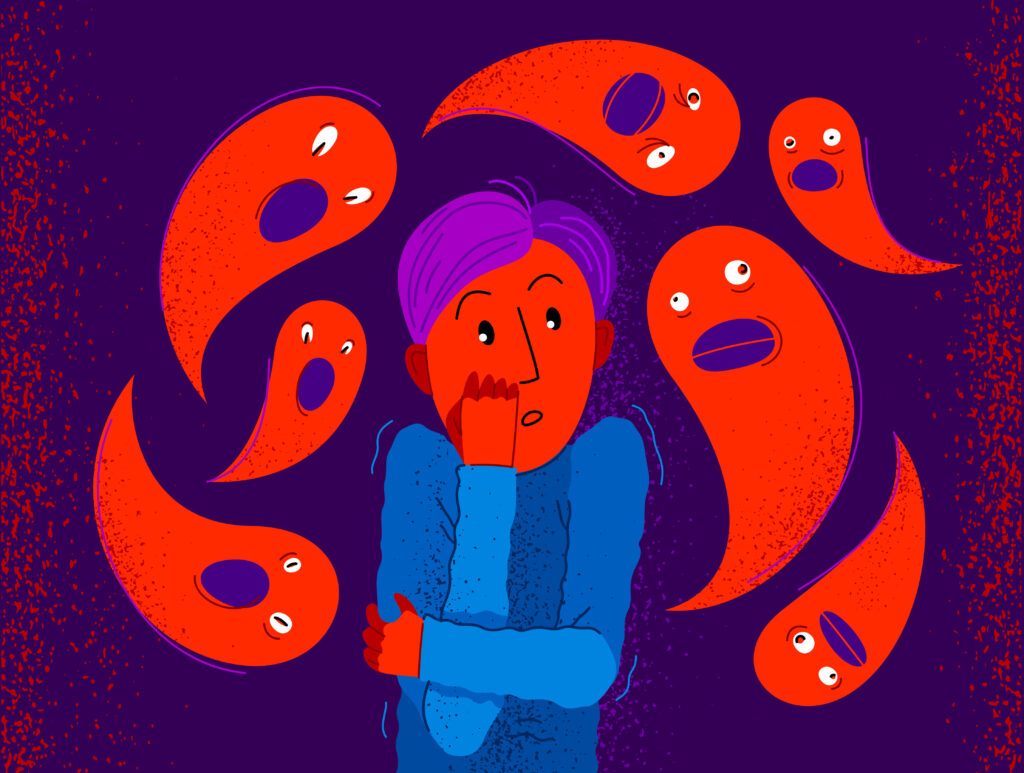
Dementia can cause a plethora of psychological conditions and ailments. Here we’ll break down a lot of the major symptoms and how they can be treated by caregivers.
- Delusions: false beliefs that persist despite evidence to the contrary
- Hallucinations: Hallucinations are a symptom of several types of dementia, including Alzheimer’s disease, Parkinson’s disease dementia, and Lewy body dementia. They can involve our loved ones seeing, hearing, feeling, tasting, or smelling things that aren’t there.
- Confusion: difficulty understanding or interpreting information
- Agitation: excessive restlessness or irritability
- Depression: feelings of sadness or hopelessness
- Anxiety: intense worry or fear
- Paranoid thoughts: distrust or suspicion of others
- Disorientation: confusion about time, place, or identity
- Memory loss: difficulty retaining or recalling information
- Changes in behavior or personality
Each of these can be difficult to treat, but medications and strategies are available for caregivers of loved ones with dementia or Alzheimer’s disease:
- Delusions: Delusions can be challenging to treat, but medications such as antipsychotics can help. Psychotherapy, especially cognitive-behavioral therapy, may also be beneficial in addressing delusions. In some cases, changing the environment or living situation may be necessary.
- Confusion: Confusion can be caused by a variety of factors, including medical conditions, medication side effects, or lack of sleep. Treating the underlying cause can help reduce confusion. Keeping a consistent routine, simplifying the environment, and providing clear and concise information can also be helpful.
- Agitation: Agitation can be treated with medication, such as antipsychotics or antidepressants. Environmental modifications, such as reducing stimuli, can also be beneficial. Engaging in calming activities, such as exercise or meditation, can help reduce agitation as well.
- Depression: Depression can be treated with medication, such as antidepressants, as well as psychotherapy, such as cognitive-behavioral therapy or interpersonal therapy. Engaging in activities that bring joy and fulfillment, such as hobbies or exercise, can also help reduce depression symptoms.
- Anxiety: Anxiety can be treated with medication, such as benzodiazepines or antidepressants, as well as therapy, such as cognitive-behavioral therapy or exposure therapy. Practicing relaxation techniques, such as deep breathing or progressive muscle relaxation, can also help manage anxiety symptoms.
- Paranoid thoughts: Paranoid thoughts can be treated with medication, such as antipsychotics, as well as therapy, such as cognitive-behavioral therapy. It may also be helpful to avoid situations that trigger paranoid thoughts and to engage in activities that promote relaxation and well-being.
- Disorientation: Disorientation can be caused by various factors, including medical conditions, medication side effects, or cognitive decline. Treating the underlying cause can help reduce disorientation. Providing a structured and familiar environment, along with clear and concise information, can also be helpful.
- Memory loss: Memory loss can be treated with medication, such as cholinesterase inhibitors, as well as lifestyle modifications, such as engaging in mentally stimulating activities and maintaining a healthy diet and exercise regimen. In some cases, therapy, such as cognitive rehabilitation, can also be beneficial.
- Changes in behavior or personality: Changes in behavior or personality can be caused by various factors, including medical conditions, medication side effects, or cognitive decline. Treating the underlying cause can help reduce changes in behavior or personality. In some cases, therapy, such as family or caregiver support therapy, may also be beneficial.

It’s important to note that treatment options will vary based on the individual and the underlying cause of the symptoms, whether it’s Lewy Body Dementia, Parkinson’s Disease Dementia, Frontotemporal dementia, or any other diagnosis (or lack thereof). A thorough evaluation by a medical professional is necessary to determine the best course of treatment.





